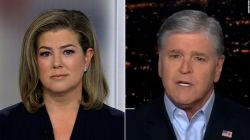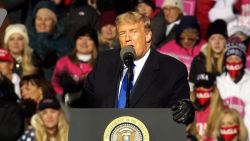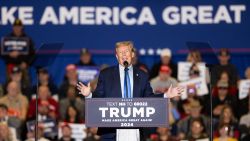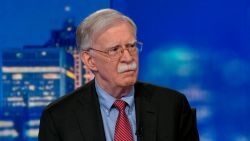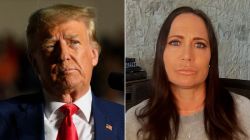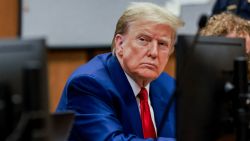Never interested in government details, President Donald Trump now wants to purge officials of dubious loyalty. Wall Street is reminding Americans a weakened executive branch carries risks.
The two-day plunge in financial markets reflects growing alarm over the threat coronavirus poses to the economy. Containing that threat depends in large part on the skillfulness of the Trump administration’s response in concert with governments abroad.
That response has not inspired much confidence this week, even as the number of known coronavirus cases in the US remains small.
Trump, from India, and economic adviser Larry Kudlow, from the White House, offered the same message within 24 hours: coronavirus is under control, and falling stock prices offer investors a buying opportunity.
Markets kept dropping. And Republican senators joined Democrats in questioning the administration’s readiness.
On Wednesday, Anthony Fauci, the director of the National Institute of Allergy and Infectious Diseases, said things in the US are “under control” – but warned that the outbreak is getting “closer and closer” to pandemic status. “Things are stable here, but we need to be ready,” Fauci said on CNN’s “New Day.”
Trump, freshly returned from India, on Wednesday morning announced a 6 p.m. ET White House press conference with representatives from the Centers for Disease Control and Prevention – but simultaneously attacked the media for “doing everything possible to make the Caronavirus look as bad as possible, including panicking markets.”
The President has previously speculated that warmer spring weather will kill off the virus by itself. To chair an administration task force on the crisis, he chose Alex Azar, who already has a full-time job as Health and Human Services secretary.
“It’s challenges like this that require you to have experienced, competent people in the government, and … a President willing to listen,” says Ron Klain, a veteran of Democratic administrations who knows the challenge well. In 2014, President Barack Obama tapped him to coordinate the aggressive US response that helped bring a deadly Ebola outbreak under control.
Instead, Trump has fired administration officials who testified in House impeachment proceedings and placed his 29-year-old former “body man” John McEntee in charge of presidential personnel. A one-time college football player fired from the White House in 2018 over gambling debts then considered a security risk, McEntee has begun reviewing whether more officials should be ousted for disloyalty to Trump. McEntee has also hired a college senior to fill a top role in his office, a source familiar told CNN on Tuesday.
Personal loyalty to the President has not been the organizing principle for the federal workforce since civil service reforms eliminated the “spoils system” in the 19th century. As Obama gave way to Trump in January 2017, his federal workforce chief urged further modernization of personnel practices to attract and empower high-skill workers for the digital age.
In his family business and the White House alike, Trump has shown different priorities. Facing repeated legal trouble – from a federal race discrimination lawsuit in his 20s to impeachment for abuse of power in his 70s – he has relied on insular collections of relatives and close associates that elevated loyalty above other qualities.
The scale of the executive branch challenges that operating style. Trump has adapted in part with passivity; according to the Partnership for Public Service, he has not even nominated candidates for a quarter of the 743 top administration jobs requiring Senate confirmation.
He has shed respected Cabinet secretaries and aides who pushed back against his impulsive decision-making in hope of maintaining professional discipline. That has often left Trump with second- or third-string advisers serving temporarily because they lack support for Senate confirmation.
Handling the global coronavirus threat involves diplomats and security aides as well as health officials. Trump’s State Department has been sapped by the ouster of experienced foreign service officers and morale problems among those who remain.
His Department of Homeland Security has lacked a permanent secretary since Kirstjen Nielsen departed last year. “Acting” officials – people unconfirmed by the Senate – currently serve as Director of National Intelligence and chairman of the Council of Economic Advisers.
“He faces this with a bench half-filled,” Klain observes. In 2018, the White House eliminated the National Security Council job Obama created to guard against future pandemics by institutionalizing the role Klain played on Ebola.
The GOP has long identified itself as the anti-government party. On issues from federal pay to the regulations that implement laws Congress passes, Republicans routinely make “Washington bureaucrats” their punching bags. Trump denounces a “deep state” hostile to his agenda.
His attempts to starve federal agencies have gone too far even for fellow Republicans. Lawmakers have ignored proposed cuts, renewed in his 2021 budget, for such critical agencies as the CDC and the National Institutes of Health.
History shows the cost of bungled management. Obama paid a political price for the botched rollout of the Affordable Care Act; George W. Bush paid a bigger one for his failed response to Hurricane Katrina.
Trump privately fears such damage even while publicly declaring coronavirus “under control.” He has groused about decisions by aides, including to let 14 Americans who had tested positive for coronavirus fly back to the US.
Before business leaders in India, the President betrayed his concern by distancing himself from responsibility. Trump likened coronavirus to an external blow that rattles a successful company but “had nothing to do with you.”
Klain credits the administration with doing some things right. He cites the “world-class” push for a vaccine under Fauci, the “national treasure” who oversees work on infectious diseases at NIH.
But coronavirus can only be contained if Trump heeds that sort of expertise, Klain concludes. “In the end, the virus does not listen to the President’s tweets.”












